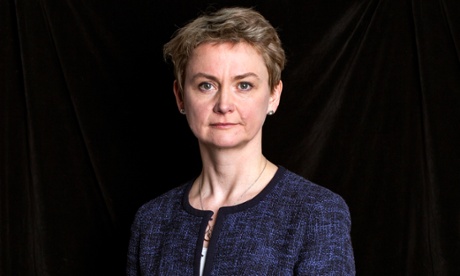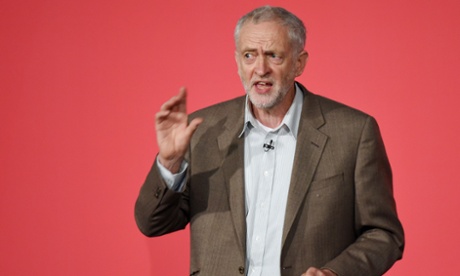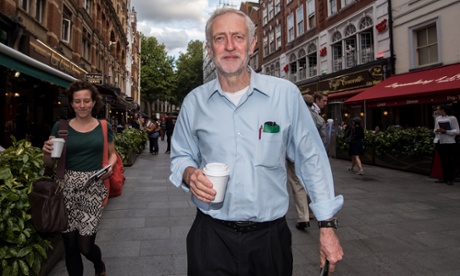It has been the most momentous fight within the Labour party in at least three decades, and also the most divisive. As this summer’s unexpectedly electric leadership race has developed, the candidates have all spouted platitudes about bringing the party back together once the race comes to an end. On Saturday, one of them is actually going to have to do it. So how could the radical frontrunner, Jeremy Corbyn, and the only two rivals who have any chance of stopping him – Yvette Cooper and Andy Burnham – start putting the pieces back together?
Jeremy Corbyn
If he wins the leadership, Corbyn will do so because an insurgent movement in the country has put him there. But he would face huge challenges in managing the parliamentary party, where he would start off backed by only about 20 MPs, less than 10% of the total. The other 90% have many misgivings, but foremost among them is a conviction that the voters they met on the doorstep who were reluctant to trust Labour with their taxes in 2015 are never likely to entrust the leftist Corbyn with the public finances.
This starting point makes Corbyn’s choice of shadow chancellor his most important decision by far. In his final campaign rally in north London on Thursday night, Corbyn referred to discussing economic policy with his friend and campaign chief John McDonnell – lending credence to reports that McDonnell’s name is in the frame.
Despite McDonnell’s intelligence, this choice would risk Corbyn getting off to precisely the wrong start with a sceptical parliamentary Labour party (PLP). That is not only because of McDonnell’s trenchant hard-left economic views, but also because of his combative approach. His unsuccessful attempt to run for the leadership in 2010 – when he dropped out because he could only amass half the nominating MPs he needed to make the ballot – attests to his lack of political friends.
A better way to build bridges into the parliamentary party would be to appoint a solid Labour loyalist, on the practical left. Assuming she doesn’t win the deputy leadership, Angela Eagle would be a shrewd choice. A gritty and battle-hardened campaigner, she has also been a junior Treasury minister under Gordon Brown and shadowed the chief secretary’s role under Ed Miliband.
Beyond the shadow chancellorship, the construction of a Corbyn cabinet would be a delicate affair. As the campaign has progressed, and his chances of victory have increased, some figures on the party’s centre-right, such as Chuka Umunna, who had initially sounded alarms about the leftwing insurgent, began to make more emollient noises. Corbyn would never have a better chance to capitalise on their promises to work with him than in the hour of victory.
Bringing in a few distinctly New Labour figures is a necessary part of building a big tent, but it would be even more important to build more solid support in the party’s centre-left mainstream. Watch out for whether Hilary Benn, Owen Smith and Maria Eagle are in the top team.
The two biggest coups for Corbyn to land would be his predecessor, Ed Miliband, who would need an awful lot of persuading (his willingness to serve has been the subject of mixed reports), and his rival Andy Burnham. During the campaign Burnham has suggested he would work with whoever wins, but also made plain that he could not be part of a shadow cabinet that turned against Nato or the EU.
To survive at the helm of a sceptical parliamentary party, Corbyn would have to pick his fights very carefully in such fields. Voting against Trident renewal is probably sacrosanct for him, but he has already relegated his thoughts about Nato and the EU reform to mere suggestions, rather than policies. And on the European referendum in particular, where he had initially insisted that he would not give Cameron a free pass, he has has more recently conceded that he could not imagine Labour campaigning to take Britain out.
Beyond the big issues, Corbyn as party leader would face questions of political style. Would he begin dressing in a smart suit? Would he accept the leader of the opposition’s government-issue chauffeur-driven car? Would the career rebel try to whip his troops into line to inflict morale-boosting parliamentary defeats on a tiny Tory majority? Or would he seek to build on his campaign promise of a “new politics” by letting his troops set their own march instead of seeking to impose discipline?
Andy Burnham
Shocked by the strength of the Corbyn surge, Andy Burnham said in August that he would offer the veteran leftwinger a place in a Burnham shadow cabinet. Burnham said that he wanted to harness the campaigning “energy” that Corbyn had brought to the leadership race, which might be most easily done through the role of Labour party chair.
If Corbyn wished to serve at all under Burnham, however – and he never previously showed much sign of wishing to sit on the frontbench – he might dig in for a big job where he could actually shape policy and not merely organisation. That would present Burnham with a real dilemma. Corbyn’s virtual pacifism and ambivalence about Europe would rule out foreign affairs and defence, and his libertarianism would preclude home affairs and justice, areas in which Burnham has more populist instincts.
Having started his campaign by arguing that Labour would not rebuild trust with swing voters until it came clean about having spent too much, Burnham would not dream of letting Corbyn anywhere near the shadow chancellorship or related economic roles. That leaves the big public service briefs, such as health and education, as the most plausible possibilities. Corbyn could campaign robustly against Tory policies in either, but Burnham – a former health secretary – would worry about Corbyn creating the impression that Labour’s chief ambition was to wind back the clock on all the changes and reforms of the last 30 years.
Corbyn would be deemed unsuitable for work and pensions because his indiscriminate opposition to benefit cuts is seen as out of step with public opinion. But Burnham, who has been publicly contrite about the frontbench’s ill-judged refusal to vote against the second reading of the government’s welfare bill at the start of the summer, could now reach out to the left by campaigning vigorously against this legislation.
If Corbyn did not serve, or indeed if he did but rapidly resigned, Burnham would surely seek to keep the broader Corbyn movement on board by finding junior frontbench roles for some of his rival’s up-and-coming backers in parliament: Richard Burgon, Clive Lewis and Cat Smith.
Yvette Cooper
Unlike Burnham, Yvette Cooper has made it plain that, win or lose, she could not imagine sitting on the frontbench with Corbyn “unless Jeremy changes”, something that no opinionated 66-year old is likely to do. So there would be no big job for Corbyn in a Cooper shadow cabinet, and the new leader will instead seek to reach out to the left by highlighting some of the traditional Labour values she burnished during the campaign.
Cooper was, for example, firmer than Burnham and her fellow candidate Liz Kendall in insisting that Labour should refuse to apologise for the level of social expenditure before the crisis, insisting that this played no part in the later battering of the public books. A carefully crafted Cooper conference speech could thus credibly offer a dash of the anti-austerity argument those who have rallied around Corbyn want to hear.
An unexpected Cooper victory would owe something to her adroit move, late in the campaign, to get ahead of the government by calling for the UK to take more Syrian refugees. This would open up a path to the moral high ground, which Cooper could further seek to stride along by using the conference to develop her campaign idea of rewriting clause IV of the party constitution, which was written by Tony Blair, to clarify that reducing inequality was the party’s defining purpose.
At Westminster, an early decision on authorising airstrikes looms. Corbyn and the grassroots movement behind him have been passionately against Britain’s recent military entanglement overseas, while Cooper has struck a note of open-minded scepticism towards joining in with US strikes on Syria. By coming down against the vote when the time comes, Cooper could build bridges with the anti-war left.
Even though there would not be a job for Corbyn, after this campaign Cooper would need to bring some leftists into her team. Jon Trickett, a Corbyn supporter who was Gordon Brown’s parliamentary private secretary and later sat in Miliband’s shadow cabinet, is an obvious choice for a big job. He is a neighbouring Yorkshire MP with whom her camp feels it can do business because – unlike most of the Corbynistas – he is used to the disciplines that come with a frontbench role.











